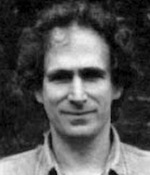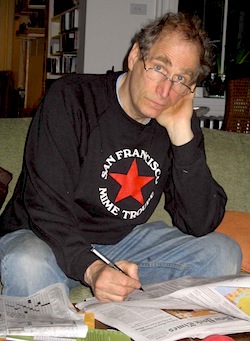
| Jacket 39 — Early 2010 | Jacket 39 Contents page | Jacket Homepage | Search Jacket |

This piece is about 4 printed pages long.
It is copyright © Kristen Gallagher and Jacket magazine 2009. See our [»»] Copyright notice.
The Internet address of this page is http://jacketmagazine.com/39/perelman-intro-by-gallagher.shtml
Photo: Bob Perelman
Back to the Bob Perelman feature Contents list
1
I wanted to do this special feature for Jacket on the work of Bob Perelman because I noticed a dearth of writing available on the internet about his work. There is a fair amount written about Language Poetry in general, and more if you have access to the search engines JSTOR, Project Muse, etc., or if you know how to search recent dissertations. But even then, I was surprised to find fewer essays focusing on Perelman alone than I had hoped for.
2
So I decided to edit a collection, and a special issue of Jacket seemed the obvious choice. I knew their editors liked this kind of work and, rather than edit a book, I chose the format of easily accessed online materials to best serve the largest audience. Books take forever and not many people buy them anymore. I wanted people to have access to this as soon as possible and for free.

Bob Perelman, 2009
3
This search for work on Perelman that I’m describing began as a curiosity, just for the hell of it, not because I had an academic project in mind or felt I needed something for my teaching. However, once I thought of editing something it occurred to me how useful it would be to have some pedagogical support for the teaching of Bob’s work or some essays for new readers that might help them get a sense of the Perelman’s context. I’m pleased this issue has many pieces that can work for both the newcomer and the experienced reader of Bob’s work. I am especially excited about the number of interviews, and the fact that we were able to collect work that reflects on the whole range of Perelman’s writing so far from his early work to Iflife, including not only poetry but critical writing, reviews, and The Grand Piano.
4
Because The Grand Piano has done so much work contextualizing a generation of Bay Area poets, I also wanted to avoid repeating too much of what was already documented there. I wanted a set of contributors that would be a little surprising, not expected. I didn’t want readers to open up the issue and see a list of names that would get the following response from a younger or a more cynical reader — “Oh, it’s all the Language Poets writing about Bob.” I wanted a small-ish group from Perelman’s generation of poets, and a slightly higher number of people in their 30s or 40s who have different perspectives, different memories. And I wanted some seasoned critics. We got all that. I had hoped for more women, but alas arriving at a 50/50 gender balance always becomes a challenge. It’s a challenge I’m tired of talking about so I’ll leave it at that.
5
Included here are a few, but certainly not all, of Perelman’s former poet-students. I like to think of the differences between myself, Josh Schuster, Louis Cabri, and Mike Magee as a kind of testament to the ranges of Bob’s influence. Not to say that who any of us has become traces directly and only back to Bob, but I think the four of us all agree his presence, his generosity, his insight, the kinds of courses he taught, had tremendous effects on us. For me, Mike and Josh, who were newer to poetry than Louis upon first meeting Bob, his interests and his way of being with us were a series of first permissions.
6
In terms of coursework, I learned a great deal from Bob. For example, his “History of Poetics” class, a tour de force syllabus that situated historically what seemed like every avant-garde issue or practice. We had a week on the Vernacular where we read Brathwaite alongside Dante and Wordsworth; we had a week on the Oral Tradition where we read Plato and Havelock alongside David Antin; we had a week on the Imagination where we read Coleridge alongside Williams and Hejinian. We learned Bob got a sense of permission for “The Marginalization of Poetry” from Pope. It was a huge syllabus that I hung onto for years, impressive to me not only because of its scope but also because Bob squished the whole thing onto one side of a typewritten sheet of paper. Economy!
7
The best parts about working with Bob involved the conversations we’d have outside class. Several times one summer he helped me with a paper on The Cantos that I was working on independently. He would meet with me and line-by-line work through a 30 page paper written at a time when I barely knew what I was trying to say about any kind of poetry at all, giving me pointers on everything from language and sentence structure to issues not to be passed over lightly, like figuring out exactly what Pound knew about Mussolini, what was real what was imagined.
8
I remember when I was thinking about going to grad school, I asked Bob if I should get an MFA or a Ph.D. He said, “Hmmm, do you like shooting pool and worrying about who is sleeping with who?” “Um, not really,” I said. “Well then I don’t recommend the MFA,” said Bob, “But really, why do you need grad school, you have a great situation here in Philadelphia, you should think very seriously about whether you need the full graduate course load in order to write.” And then with a slight tilt of the head and tone that those who know him will all be familiar with, “I’m not so sure you do.” Stubborn, I insisted on going anyway.
9
I said that I wanted it so I could teach, work in a college English Department (READ: Be like you, Bob). It seemed like such a great life. “Ah,” he said. “Wanna see this?” He picked up his beat up leather shoulder bag, literally bursting at the seams with papers. “This is what being a professor is largely about. You get to see the fun part, when I’m with you guys. But this (laboriously waves overstuffed satchel at about midriff height) this is what you don’t see. Meetings, committees, reading applications. Being a professor is largely about carrying around loads of paper.”
10
Never, ever do I forget that exchange. Why? Because it turned out to be so true. I went to grad school and got a Ph.D. and I don’t regret my decision (or maybe the student loan bills have psyched me out). But Bob was right. And, like many revealing student-teacher moments with Bob, it was funny. That image of him with the worn out leather case full of papers, barely able to lift it as he tries to wave it around, making that “I’m breaking it down for you now” Bob face — forehead tilted toward me, serious eyes turned slightly upward — that image stays with me, makes me laugh at the moments I’m about to totally lose it from too many meetings. And I have to say I probably think of this scene once a week, seriously.
11
Another important moment came later, when I was in grad school and came down to New York City to give a reading at Segue. Part of my reading included some work I was doing trying to explore Buffalo’s troubled history. Yes, a Buffalo student writing “history poems” in the tradition of Olson and Howe — go figure! But I didn’t know how to do it at all. The real problem was this: I wrote poems using a lot of the language from the Buffalo local history archives, but I clearly hadn’t quite learned how to make it poetry and was afraid to be too direct. Somehow I had taken from my language poetry background a fear of being “clear.”
12
Bob came to my reading and afterward he told me what he liked (other work, not the history stuff) and then said something that changed my view of the whole scene of writing. About the history poems, he said, “you know the idea isn’t to just take a bunch of words and jumble them up. If there’s something you want to say, something you think people need to know about this history, then just say it. Alot of people misunderstand language poetry to be about just jumbling up words, but it is not about that. Some people mistake the difficulty for jumbling. But it’s never jumbling — unless it is but that doesn’t happen often because it doesn’t need to happen often. But if there’s something you need to say, just say it. If you think about it, what’s the point of doing the history poem if no one can learn anything from it.”
13
I suppose I am paraphrasing slightly, but only slightly. I’m pretty sure I remember this quite clearly. The critique was generous, something I had gotten accustomed to from Bob back in Philly — he never lied to us. These words changed my writing of that project, and all my writing since. It helped me see how much this misunderstanding of language poetry afflicts not only its critics but also some of its followers who write and publish all around me even today.
14
All of these reasons contribute to why I wanted to put this issue together. But more than anything, it’s Bob’s poetry that drives me and all of us here. That is what this issue is about. I don’t want to summarize the issue for you — just read the essays, interviews, and poems and think the range of thoughts they make available. Enjoy that, it seems to be one of the last bits of freedom left to us.
15
And even though with Bob it’s all about the reader’s thinking, the practice of freedom in the mind, it’s ok to enjoy the author here, too. That rare intelligence, that swerving Jamesian consciousness fueled by the car from Back to the Future, driving back and forth between images of hot commodities, the real language of Ronald Reagan, and the dreams that keep only a sliver of hope continually peeking at us over the horizon. Drive towards it, enjoy it, and thank Bob for the future memories.